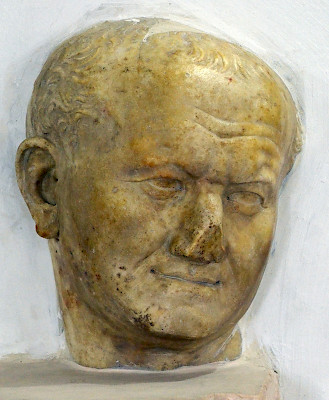Vespasian
Messiah (mâšîah, "the anointed one"): Jewish religious concept, a future savior who will, in some sense, come to restore Israel. The nature of both the Messiah and the restoration was a matter of debate, and there were several claimants.
Vespasian (67 CE)

Sources: Cassius Dio, Roman History, 65=66.1.4, 65=66.8.1; Flavius Josephus, Jewish War 3.399-404 and 6.310-315; Suetonius, Life of Vespasian 4.5; Tacitus, Annals, 15.47; Tacitus, Histories, 5.13; Zonaras, Epitome 11.16.
Story: The Roman general Vespasian, who attacked the Jews, may seem an odd candidate for a Messiah, but nonetheless, his coup d'état in 70 was regarded as the fulfillment of the famous Balaam prophecy that
a star shall come out of Jacob and a scepter will rise out of Israel. It shall crush the foreheads of Moab and break down all the sons of Sheth. Edom shall be dispossessed.note
There were two comet. One appeared in late 64,note the other, in 69, is mentioned by Cassius Dio.note Most people thought that the new ruler would be the liberator of Israel, but Flavius Josephus claims to have found the true meaning of the prophecy.
What did the most to induce the Jews to start this war, was an ambiguous oracle that was also found in their sacred writings, how, about that time, one from their country should become governor of the habitable earth. The Jews took this prediction to belong to themselves in particular, and many of the wise men were thereby deceived in their determination. Now this oracle certainly denoted the government of Vespasian, who was appointed emperor in Judea.note
The Roman authors Suetonius and Tacitus give the same interpretation of the prophecy, probably using the same source, who was not Flavius Josephus. This proves that there was at least one other author who shared Josephus' opinions.
There had spread over all the Orient an old and established belief, that it was fated for men coming from Judaea to rule the world. This prediction, referring to the emperor of Rome - as afterwards appeared from the event - the people of Judaea took to themselves.noteThe majority [of the Jews] were convinced that the ancient scriptures of their priests alluded to the present as the very time when the Orient would triumph and from Judaea would go forth men destined to rule the world. This mysterious prophecy really referred to Vespasian and Titus, but the common people, true to the selfish ambitions of mankind, thought that this exalted destiny was reserved for them, and not even their calamities opened their eyes to the truth.note
Comment: Josephus' messianology may seem hypocritical, but it is not. In his view, the Sicarians and Zealots had ruined Judaea, and God had sent the Roman general to punish His chosen people as a second Pompey. In the past, God had sent the Jews into exile in Egypt and Babylon; and he had used Philistine, Assyrian and Seleucid armies to punish his chosen people. This punishment could be considered a way to restore the true Israel. To call a foreigner a Messiah was nothing new: the Persian king Cyrus the Great had already been considered the Messiah, as we saw above.